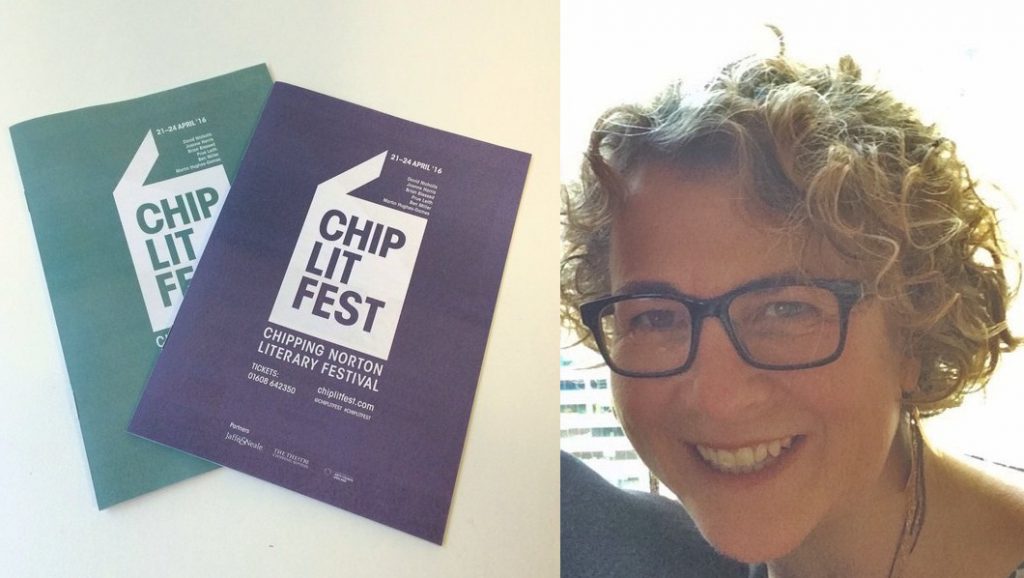This weekend marks the fifth Chipping Norton Literary Festival, where Clays Indie Publishing are running an Manuscript to Market event this year. In the run up to the festival, we spoke to Jenny Dee, the festival director, about the programme, self-publishing and author pay …
This is the fifth Chipping Norton Literary festival – how did you become involved with the festival?
I came to the third festival as an audience member. A friend of mine, on the Board of Trustees, then introduced me to the founder and director, Clare Mackintosh. I then took on the role as director designate for the fourth festival and shadowed Clare throughout until I took over as Festival Director.
How do you put your programme together? Do you approach authors or do authors approach you?
We have two programmes – one for adults and one for children which includes the work in schools and the public events during the festival weekend. I work very closely with the programme directors; we have a wish list of authors, we review the publicists’ lists of forthcoming books, we are approached by publicists and individual authors. We build and rebuild, the final version is often very different from the original plan.
How do you balance the programme in terms of fiction, non-fiction, debut authors, non-author focused and self-publishing events?
There is an element of accident but mostly it is design! We’ll review what was popular the previous year, identify gaps for a particular genre perhaps, look at what other festivals are doing. We like to include debut authors and we seem to have a knack for spotting some good ones. Most of the authors we select are traditionally published, not least because we work very closely with our partner bookshop and bookshops like to work with publishers. Book sales are obviously a very important part of any litfest, it’s why the authors come. So we always like our authors to have a recently published, readily available book. We have always included a series of workshops for aspiring writers and so exploring ways of moving from manuscript to publication is really important.
One of many events at the festival is an event with chef and self-published author, Saira Hamilton – how did this come about?
Saira contacted us as she had seen an interview our former Festival Director had given about her move from the police force to crime writing. Saira had also been in the police and is now a cookery writer. It’s a great story and we were looking to include more food and drink events, so it seemed like a perfect fit. Saira is a great example of pursuing the non-traditional publishing route and making it work.
What do you think self-publishing events add to literary festivals?
I think it’s very democratizing, writers can skip the agent and traditional publisher route and still end up as part of litfest lineups. It’s tougher out there on your own – editors, publicists and agents do make a difference, but it is not the only way. By revealing the process of self-publication, writers can see how they can transform an electronic document into a book.
There has been a lot of media surrounding author pay and author rights this year, more specifically festival pay for authors, what is your opinion on this?
At our 2015 Festival, we introduced a profit share scheme for all our participating authors. This meant that as well as paying travel and accommodation expenses, we then shared our operating profit equally amongst the authors. As a very young, small Festival, it is hard for us to guarantee an upfront fee although this is our long term aim, but we firmly believe that the authors should have remuneration for their work with us, after all without them, there is no literary festival. At the moment, a profit share allows us to pay the authors in the fairest way possible.
What is it that you feel makes ChipLit fest successful?
One of the key elements of ChipLitFest’s success is that we are able to host the whole thing in venues that already exist in the hear of Chipping Norton. This gives it a genuine community feel that is bringing energy, excitement and trade into the area. Our extensive series of workshops and events for young people also adds to the community and helps to build the next generation of readers, litfest ticket buyers and, perhaps, writers. I think we have also been pretty bold in our programming, operating under the mantra of ‘don’t ask, don’t get’. So we’ll still put in a request for JK Rowling although we probably have to concede that she won’t be visiting for a while.
Why are literary festivals important?
I think that there are so many points of entry into a litfest. It may be because the speaker if familiar from the small screen, it may be that a storytelling session is a perfect way to entertain your toddler, most likely it is because of a much-loved book or a burning interest in a particular topic. But the shared experience of listening to a speaker who brings their expertise and hard work to an eager audience is indeed very powerful. One of the things I have most enjoyed so far in my role as Festival Director has been when people have told me how much they love the writing of a certain author and how thrilled they are at the prospect of meeting them and being given an insight into their creative world.
Clays Indie Publishing is running an event on the Saturday 23rd of April, talking through the Indie Publishing market and journey. If you have a manuscript and are wondering about indie publishing, click here to find out more about our event!
Clays Ltd are proud to sponsor ChipLitFest
